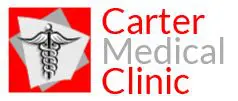Skip to content
New Carter Clinic Summer Recommendations
1
Coronavirus & Flu – Keep Contact to a Minimum, Wash Hands with Warm, Soapy Water, Use Hand Sanitizer Frequently, Wear a Mask if You are Sick, and listen to the Advice of Medical Professionals, NOT Social Media
2
Get Vaccine for COVID at the Earliest Availability
3
Increase Fluid Intake need to Drink ½ Body Weight in Ounces of Water Daily need electrolytes.
4
Be Aware of Skin Cancer: Skin Cancer is Almost an Epidemic Due to Time in the Sun and Tanning Beds, Which can be Very Deadly.
5
Immunizations
6
Stay Current with Vision Exam, Hearing Testing, and School Physical
7
Allergies: Remember to Take Medication-Recommend NON-Drowsy Medication
8
Alcohol Screening: Be Aware, Reach Out, and Contact Your Doctor for More Information
9
Alert for Bullying – Physical and Emotional
10
Alert for Personality Changes Consistent with Substance Abuse
11
Alert for Depression: Be Aware, Don’t Feel Alone, Reach Out, and Contact Your Doctor
12
Common Cold: Remember to Wash Hands and Sanitize for Spread Prevention
13
Coughing: Remember to Wear Masks in Public for Spread Prevention
14
Stay Active and be Aware of Weight Management for Healthy Living and Disease Prevention
15
Need Evaluation if Experiencing Appetite and/or Fluid Intake Changes
16
Wound Care Consideration: Wash and Clean the Area After the Bleeding Subsides, but Before the Final Dressing
17
Monitor hypertension: Check 1-2 times per month while sitting with the fleet flat, and bring your log to each appointment.
Elderly Considerations in the COVID-19 Situation
1
Continue to Practice Social Distancing wash hands; do not touch the Face (i.e. nose, eyes, and mouth)
2
If gloves change after being worn in Public to Stop the Spread of germs, contact with the Virus will Spread from
3
Dirty Gloves to Clean Surfaces
4
Keep a Water Supply, Eat Well-Balanced Meals, and Evaluate Fluid and Food Intake
5
If You Feel Sick – Call for Aid Before You Get Medical Care
6
Be Aware of stress and reach out to Friends and/or family.
7
PLAN AHEAD: Find phone numbers for your Physician, Pediatrician, Pharmacist, and Veterinarian
8
EMERGENCY CONTACT: Keep Neighbors, Family Members, or Persons in Mind and Aware of Your Needs
9
Other Numbers to Include: Poison Control Center (800)222-1222, Animal Poison Control (888)426-4435, Disaster
10
Distress Helpline (800) 985-5990, or text “TalkWithUs” to 66746
Carter Clinic Diabetic Recommendations
1
A1c – every three months
2
Urine Micro – annually
3
Dilated eye exam annually
4
Diabetic foot exam annually
5
ACE or ARB medication
6
ASA
7
If taking Metformin – annual B12 level
8
If Taking Invokana, Jardiance, and Farxiga: CMP every three months
9
It is not mandatory to stick your finger. Now, there is a patch that will monitor your blood sugar continually, as often as you like OR as needed.
12 Foot Care Tips for Diabetics
1
Treat your diabetes first
2
Check your feet daily
3
Ask your provider about special shoes
4
Wash your feet thoroughly every day
5
Keep your feet soft and smooth
6
Gently remove corns and calluses; OR, better yet, ask your doctor
7
Keep your toenails trimmed at all times
8
Avoid walking barefoot
9
Protect your feet from hotter and colder temperatures
10
Regularly promote blood flow to your feet
11
Exercise and eat right
12
Get advice from your doctor
Carter Clinic Recommendations
1
BMI: Each visit for BMI over 25 (dietary recommendations)
2
Mammogram: annually for women aged over 40 years
3
Cervical Cancer Screening: annually for women who have not had a hysterectomy, every five years for women who have had a partial hysterectomy, OR every ten years for a total hysterectomy
4
Colon Cancer Screen/Cologuard – every three years
5
Annual Labs: Preventative Care: CBC, CMP, TSH, T4, Urinalysis, Hepatic Function, Lipid, Direct LDL & CK
6
EKG: baseline for new patients OR anytime the practitioner feels is necessary
7
PSA: annually for men age 50 and above
8
UDT (Urine Drug Test): required for a minimum of every six months for controlled drugs and may be more frequent if indicated
Medicare Recommendations
- Statin Therapy for the Prevention and Treatment of Cardiovascular Disease-also Recommended for Diabetic Patients
- Preventative Care and Screening: Screening for High Blood Pressure and Follow-Up Documented
- Hypertension: Improvement in Blood Pressure
- Controlling High Blood Pressure
- Documentation of Current Medications in the Medical Record
- Preventive Care and Screening: Screening for Depression
- Tobacco Use and Help with Quitting
- Colorectal Cancer Screening
- Diabetes: Medical Attention for Nephropathy
- Pneumococcal Vaccination Status for Older Adults
- Falls: Screening for Future Fall Risk
- Monitoring the use of High-Risk Medications in the Elderly
- Ischemic Vascular Disease (IVD): Use of Aspirin or Another Anti-platelet
- Breast Cancer Screening
- Cervical Cancer Screening
- Dementia: Cognitive Assessment
- Monitoring Diabetes: A1c
- Closing the Referral Loop: Must Receive Specialist Report
CDC Immunization Recommendations:
- Influenza inactivated (IIV) or Influenza recombinant (RIV) OR
- Influenza live attenuated (LAIV)
- Tetanus, diphtheria, pertussis (Tdap or Td)
- Measles, mumps, rubella (MMR)
- Varicella (VAR)
- Zoster recombinant (RZV) (preferred) OR
- Zoster Live (ZVL)
- Human papillomavirus (HPV) – Female and Males
- Pneumococcal conjugate (PCV13)
- Pneumococcal polysaccharide (PPSV23)
- Hepatitis A (HepA)
- Hepatitis B (HepB)
- Meningococcal A, C, W, Y (MenACWY)
- Meningococcal B (MenB)
- Haemophilus influenzae type b (Hib)
Scroll To Top
